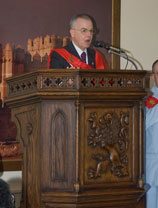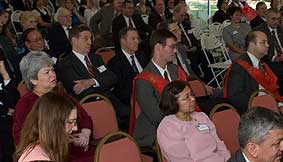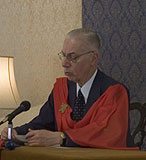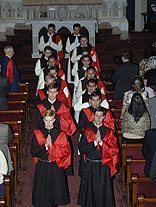
Ninety years after Fatima is a long time. The changes that have occurred since then have been monumental to say the least. From the Fatima perspective, however, these changes have largely seen a world that has not heeded Our Lady’s message.
A look at this world was the theme of a weekend of reflection. Nearly 250 supporters, friends and members of the American Society for the Defense of Tradition, Family and Property (TFP) met on October 5-7 in Spring Grove, Penn. to discuss the theme “The Counter-Revolutionary Struggle 90 Years After Fatima.”
The Columbus Day weekend event at the TFP national headquarters also served as a rallying point for the now over 2,200 Public Square Rosary Rallies schedule for October 13, 2007. America Needs Fatima Director Robert Ritchie was one of the speakers who outlined the plans for the weekend and ways to be involved.
Among the distinguished guests present at the conference was Prince Bertrand of Orleans-Braganza, who delivered the Sunday luncheon address. Traveling from Italy, Prof. Roberto de Mattei, author of The Crusader of the Twentieth Century: Plinio Corrêa de Oliveira, delivered a brilliant talk on the true spirit of the Crusade in history and how this same spirit was reflected in Prof. Plinio Corrêa de Oliveira’s fight.
An Overview
Basing their views on the book Revolution and Counter-Revolution by Prof. Plinio Corrêa de Oliveira, founder of the Brazilian TFP, the speakers focused on a Fatima perspective over the past 90 years.
American TFP Vice-President John Horvat delivered the talk, “What Does it Mean to be a Militant Catholic 90 Years After Fatima?” He especially discussed the changes that have taken hold since the Sexual Revolution of the sixties.
He explained how this Revolution was different from past Revolutions in that its tactics were less confrontational. Today’s left fights its Cultural War much more by blending and blurring distinctions, morals and customs than affirming principles. In fact, this war uses an extreme relativism that ends up destroying society by decay and torpor thus making it much harder to be a militant Catholic today than in 1917.

The “90 Years After” theme was also developed by Michael Whitcraft, assistant web editor and coordinator of the National Conference. He looked at the Fatima message and showed how the world is seeing its fulfillment. He especially focused on the “scattering of the errors of Russia” of which Our Lady spoke.
Mr. Whitcraft explained that these errors were not only those of the particular political ideology of Communism but also its moral consequences. It would also include socialist and Marxist principles that have found their way into other movements such as that of radical Islam. He also spoke of abortion, divorce and other moral problems that naturally flow from Marx’s materialistic philosophy.
Luiz Solimeo, senior researcher for the American TFP, entered into the problem of Islam. He presented the fruits of his long research into the Gnostic origins of Islam. Since the subject of Islam is experiencing renewed interest to scholars worldwide, recent studies have revealed new evidence of the sect’s origins. Mr. Solimeo dispelled many commonly held views of Islam’s history and doctrine based on careful analysis by scholars of original Islamic documents.
Sparking Interest in the Counter-Revolution
All the speakers highlighted the need to continue the always peaceful and legal struggle of the Church Militant in light of today’s challenges. Mr. Norman Fulkerson presented a description of this attitude in his talk titled “Maintaining the Epic Spirit in a Revolutionary World.” His masterful presentation analyzed many of the problems of Catholics who often do not perceive the importance and beauty of today’s struggle because it appears so ordinary and uneventful.
Mr. Philip Calder, professional musician and founding member of the American TFP, gave a fascinating presentation called “The Power of Music.” He gave a historical perspective of music through the prism of Revolution and Counter-Revolution.

Finally, Dr. Eduardo de Barros Brotero, a founding member of the Brazilian TFP who traveled from his native country to attend the conference, treated participants to an account of his personal relationship with Prof. Plinio Corrêa de Oliveira.
More Than talks
As always, the conference was about more than just talks. It was an opportunity to meet old friends and make new ones. So much of the conference is made up of those little things that provide an atmosphere that reflects the principles being defended. Even the large tent which served as an auditorium was decorated with taste and care to provide a proper ambiance for the talks.
Students from the TFP-staffed St. Louis de Montfort Academy and members of TFP Student Action were everywhere helping to make sure things ran smoothly.
The TFP’s Holy Choirs of Angels Band enlivened the event with an evening performance featuring a lively selection of pieces for drums, fifes, brass and bagpipes.
The evening candlelight Rosary procession was especially touching as the American TFP’s life-size replica of Seville’s Our Lady of Hope, Macarena was carried on a large litter by strong supporters to reign majestically over all.

Held with the permission from Most Rev. Kevin Rhoades, Bishop of Harrisburg, a Latin Mass was celebrated at the beautiful Saint Patrick’s Church in nearby York by Father Gregory Karpyn. TFP members, wearing the ever-present TFP ceremonial habit, sang the Mass. The recessional procession ended with the majestic rendition of the Papal Hymn accompanied with organ, trumpet, drum and choir.
The weekend seemed so short as the conference winded down in the closing dinner held at the grand ballroom of the nearby historic Yorktowne Hotel. As the final farewells faded into the night, the participants where recharged with energy and resolution as they made ready for the coming weekend when 2,200 Square Rosary Rallies will be held.

